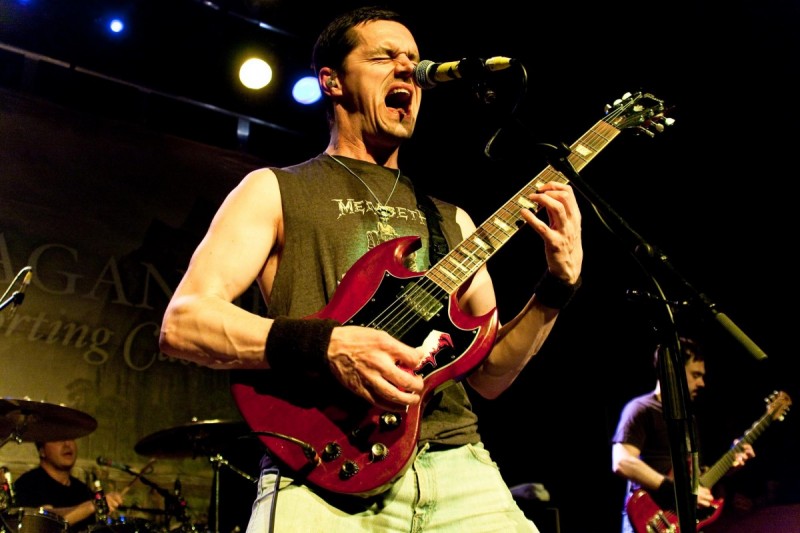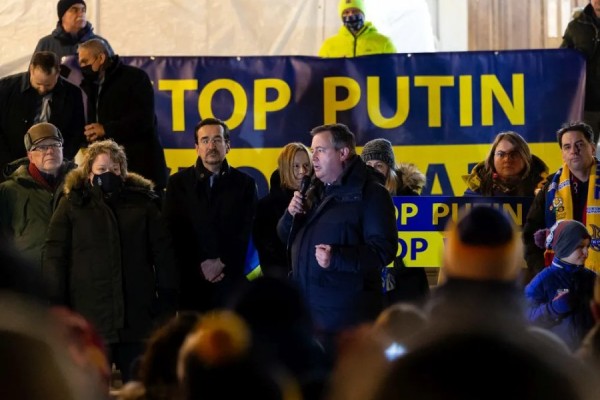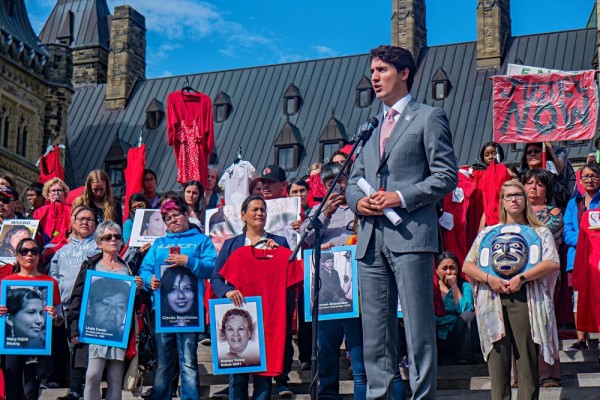An oral history of Propagandhi’s ‘Oka Everywhere’

Frontman and guitarist Chris Hannah of the Winnipeg-based thrash-punk band Propagandhi during a show in Brisbane, Australia, May 29, 2011.
This summer will mark 30 years since the start of the resistance at Kanehsatà:ke and Kahnawá:ke, commonly referred to by Canadians as the 1990 “Oka Crisis.”
In the leadup to the summer of 1990, the municipality of Oka, Quebec approved a golf course expansion and condominium construction project on a sacred piece of unceded Kanien’kéha:ka (Mohawk) land, and Indigenous land defenders set up a blockade at Kanehsatà:ke to prevent the development. In response, the Quebec government sent in the provincial police. When a police officer was shot and killed during the police siege of the Mohawk blockade the conflict escalated, and members of the nearby community of Kahnawá:ke blocked the Mercier Bridge in solidarity with those at the Kanehsatà:ke blockade. The government of Canada eventually intervened, spending over $200 million to deploy some 2,500 troops to the area as a show of force. The conflict ended in a stalemate: the municipality canceled the development, but the Mohawks are still, 30 years later, fighting ongoing land fraud and demanding the return of their land.
With the 30th anniversary of the resistance on the horizon, I recently had the opportunity to sit down with Chris Hannah, lead-singer and guitarist of the Winnipeg-based punk band Propagandhi, who wrote and released a song of solidarity with the Mohawks in the conflict’s immediate aftermath. “Oka Everywhere” was first released in 1995 on I’d Rather Be Flag-Burning, a 10” split between Propagandhi and I Spy on Recess Records. Written from the perspective of a settler, the song is an important documentation of non-Indigenous solidarity from the time.
I asked Chris to reflect on the meaning of the song and the importance of the resistance at Kanehsatà:ke and Kahnawá:ke 30 years later. Here is our conversation.
Sean Carleton for Canadian Dimension (CD): Propagandhi is known for frequently commenting on politics, current events, and counterculture. What do you remember specifically about the so-called “Oka Crisis” of 1990?
Chris Hannah (CH): Well, I remember a lot about it because it basically consumed the summer of 1990 for everyone who had a television or radio in Canada. And, particularly for me, it stands out because it was a major turning point in my life.
I mean, we had started the band [Propagandhi] just prior to that, and while we called ourselves a punk band, I wasn’t quite sure where I was on the political spectrum. To be honest, I came out of a fairly strict military upbringing and, truth be told, when I first got into punk rock, I was a right-of-centre thinker on many subjects because I had grown up so sheltered on a military base. But I was starting to have private doubts about my worldview, partly because of my own independent thinking and partly through the influence of the political punk bands that I was listening to at the time.
So, when “Oka” happened, and I was watching things unfold through what I was seeing and hearing on the news, I had some serious misgivings. I had private doubts about the whole situation. But there wasn’t anyone in my life openly siding with Indigenous peoples in the situation, so I wasn’t quite sure how to formulate my thoughts and process what was happening at the time.
But I remember feeling that something was just wrong about the whole thing. The big turning point was when I asked my dad, a high-ranking military officer, what he thought about the government sending in the military. He surprised me with his answer, actually. He turned red with anger and said that he was “disgusted” that the government would deploy the military on its own people, those were his words. He didn’t understand that the Mohawks were not “Canadians” per se, but I was taken aback by his response. His doubts served to galvanize my own thoughts about what was happening. And I was like, okay, fuck, if he thinks this is wrong, if he thinks this is immoral, from his very biased perspective, then my private doubts must be right, that what I’m seeing really is fucked. The combination of all those things really had an impact on me.
Even more so, I grew up in rural Manitoba and most of my hockey was played with the Indigenous kids from surrounding reserves and they were usually on my team. I got to see firsthand what they were subjected to in some small towns in terms of racism. We would have games where the entire team and all the families had to gather in the dressing room and leave the arena together because people would be waiting in the parking lot to fight us. So, I had some background that helped fuel my private doubts before 1990. Like so many other Canadians, I had experience witnessing anti-Indigenous racism, but I didn’t really know what to do with it as a kid. I just understood those things on a personal level. I didn’t have a wider view. But seeing the police and military attack the Mohawks in 1990 allowed me to develop a more systemic critique of anti-Indigenous racism and ongoing colonialism in Canada.
SC: Why did you turn to music to process some of your private doubts and feelings of frustration?
CH: Music was my outlet, my way of breaking out of my limited worldview at the time. And in the wake of Oka, there was more attention paid to Indigenous-settler relations and to the other conflicts and blockades [Gustafesen Lake and Ipperwash among them] happening around the country at the time. It wasn’t quite like the Idle No More resurgence a few years ago, but there was a feeling in the early 1990s that things were changing.
Prior to Oka, the question of Canada versus the people of Turtle Island felt like a settled one in white Canada’s mind, it was over. It was done. There was nothing to talk about. “We won, you lost” kinda thing. That’s how it felt. But in the early 1990s, there were these pockets of disturbance to that idea. It was like, “okay, well what’s going on here? I thought this was all settled.” The odds seemed so stacked against Indigenous peoples [prior to 1990] that it was pretty inspiring to witness the Mohawk resistance. As someone who was starting to question my education and what I thought I knew about Canada and Indigenous-settler relations, it was hopeful seeing folks who had little chance of success choosing to resist and take a stand because it was the right thing to do. So, at that point, I felt so inspired that I wanted to share that inspiration with everyone, so I attempted – in my high-school poetry mode of thinking – to convey that feeling through music. That’s how the song [“Oka Everywhere”] came about, essentially. It was me trying to capture my feelings of frustration at that moment, as a non-Indigenous settler Canadian. It’s pretty much high-school poetry, so it’s a little terrifying looking back at it, to be honest.
SC: In terms of how Propagandhi songs get written, how did “Oka Everywhere” make it from your notebook to being recorded and released?
CH: In general, our song writing at the time was pretty hap hazard. The music and lyrics were composed separately and then put together later, with me singing the lyrics overtop of the music in the studio. I don’t have too many memories about the song being a whole band effort, as us trying to make a statement as a band. The way we do things now is completely different, it is more of team effort where we cobble things together. But back then we were all working separate jobs and pretty busy, with just one band practice a week. So, it was basically just show up and make the music, then sing something over it and the song was done.
So, I can’t really remember too much about the particular process for this specific song, but I do know that we were all on the same page about the lyrics of the song. Its meaning and message were shared by the entire band, for sure. Everyone in our scene was inspired by what was happening.
SC: When was the last time you had a look at the lyrics of “Oka Everywhere”?
CH: It’s been a while to be honest. I always cringe at some of those early songs.
SC: What do you make of the song’s lyrics almost 30 years later?
The best thing I ever saw on TV
Was that S.Q. cop catching a bullet with his teeth
Condolence, madame Canadiana
But your husband was a fucking stuck pig
But this song’s not about some romantic account of history
It’s not about martyrs or mythos or heroes or burnings-in-effigy
It’s about a native kid flipping her lid just trying to keep some self-respect intact
It’s about an Oka the size of a fist in resistance and a will to fight backThe girls at work, they still deny their racism
They claim tolerance for all
But it seems the degree of only racial slurs is their gauge
And it defines tolerance as hateAnd there’s 27 million “girls-at-work” here
Imagine fighting that 500 yearsAnd golly-gee, how valiant how the white oppressor makes allowance
For calculated gestures of insurgence
All tightly tethered to their purses/purposeOka had this orchestra aborted
Oka fucked their rules to choose a future self-determined
And I support it
And the best thing I think I ever said
If a Kevin Kostner Kavalry is your means to their end
Then the struggle is dead
Why do we pretend that our approval is upon what they depend?
CH: The premise of the song I don’t mind in hindsight, but that first line makes me cringe. I mean, it came from a place of honest frustration and rage, but it is also the shitty poetry of a pretty privileged, sheltered white kid. And, I just really regret that first line, minimizing the loss of human life like that. It’s too flippant. The guy had a name [Corporal Marcel Lemay]. I don’t even know what he thought about being there. And, well, that part just bugs me. The rest of the song I’ll stand behind, but that first line I don’t like. The premise all still makes sense to me – pointing out the injustice and hypocrisy of colonial Canada – I just wish I could have another chance at that first line, 30 years later. Just being flippant about someone being killed doesn’t sit well with me now. It’s too much for me now. I mean, I understand where it came from and why I wrote it that way, but there’s a part of me that just sees a callous, young, idiot, you know.
But you re-reading the lyrics also just triggered a memory. As a kid, people would often say, “oh, I’m not racist, I just don’t like Indians.” That struck me, even when I was young. I was like, “fuck, imagine enduring 500 of years of that.” Being treated like a subhuman. That always struck me as something “special” about Canada, but then later I had the opportunity to travel to other places with histories of British colonialism like Australia and you see the same kinds of things there.
SC: How do you feel the song’s overall message stands up?
CH: Well, once a song is out there in the world, it’s no longer yours, right. I think the major difference between “Oka Everywhere” and more recent Propagandhi songs (like “Comply/Resist”) that deal with Indigenous-settler relations is aesthetics. Like, they [“Oka Everywhere” and “Comply/Resist”] are kinda the same song, actually, in terms of message. We’ve been consistent on that issue. The premise, in some ways, is the same, but the method of delivery is different. I’m someone who is 30 years older whose aesthetic has changed, in terms of word play and musical taste.
For “Oka Everywhere,” the full credit goes to the Mohawks at Kanehsatà:ke. If there is credit for a song like “Comply/Resist,” it’s partly Idle No More and partly the victims of police violence in the United States. So, in some ways, “Comply/Resist” is an updated version of “Oka Everywhere.” Same song but different cultural references, and someone who is 30 years older. Who knows, in 30 years I’ll maybe think “Comply/Resist” is like high-school poetry, too, or more like middle-aged poetry.
SC: With the 30th anniversary of the so-called “Oka Crisis” coming up, here’s a question: would younger you have been surprised to learn that the issues you were singing about in “Oka Everywhere” would still be going on, basically unchanged, 30 years later?
CH: Sadly, no. It’s hard to imagine, with who I am now, that I would’ve thought there would be any meaningful change/progress because “Oka” was really polarizing, the gloves came off, and I didn’t feel like white Canada was going to make any concessions. On the other hand, especially with the advent of Idle No More, I’m surprised, or I should say inspired, by Indigenous resilience and continued resistance and resurgence. I had similar feelings of shock, hope, and inspiration to be honest, with Idle No More. That despite what we thought was game over, Indigenous people will continue to resist and fight for their rights.
So, on the one hand there has been zero progress, and on the other there has been an important resurgence. 30 years on, I still support it. Indigenous peoples are just ahead of the curve. Canada hasn’t moved from its core colonial positions, but Indigenous peoples continue to fight for the land and environment for everyone while us colonizers keep pressing on with narrow-minded policies based on profit and exploitation. At this point, Indigenous peoples are leaving us in the dust on the important issues of the day.
SC: Lastly, the song is called “Oka Everywhere.” Sadly, not much changed in Kanehsatà:ke as a result of 1990, but there have been some inspiring resistance movements across Turtle Island, like the Zapatistas and the #NODAPL movements, thanks to the perseverance and resilience of Indigenous land defenders. Were you anticipating/hoping for the energy of “Oka” to spread everywhere?
CH: Canada, like other colonial countries, has consistently underestimated the resilience of Indigenous nations, and if you keep underestimating Indigenous peoples, you’re fucked. That’s the lesson. I was trying to say that 30 years ago, and I’m still trying to say that today. One way or another, that’s the lesson Canadians need to learn.
Sean Carleton is a historian and a coordinating editor with Canadian Dimension.
Chris Hannah is the lead singer and guitarist of Propagandhi.










